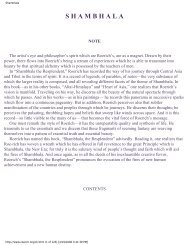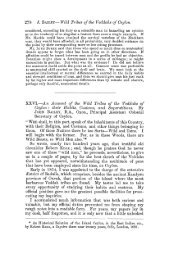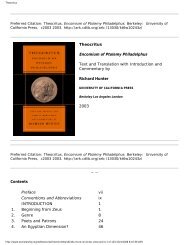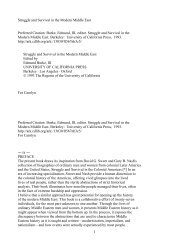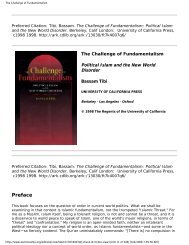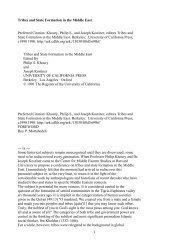Between Two Worlds Kafadar.pdf
Between Two Worlds Kafadar.pdf
Between Two Worlds Kafadar.pdf
You also want an ePaper? Increase the reach of your titles
YUMPU automatically turns print PDFs into web optimized ePapers that Google loves.
― 87 ―<br />
chronicles relate that another prominent figure in the Bithynian frontier at the<br />
time of Osman was a certain Sheikh Ede Bali, who "displayed many miraculous<br />
deeds and was the pivot of the people's faith. He was known as a dervish, but<br />
dervishness was in his esoteric being. He had plenty of worldly belongings and<br />
livestock."[79] This rancher-dervish may have been a fictive character, but the<br />
fictionalizing chroniclers of the early Ottoman gaza exploits had so much<br />
respect for the character that they made him the father-in-law of Osman Gazi.<br />
Thus another pair of seemingly contradictory values could peacefully coexist in<br />
the frontier: on the one hand, living one's life according to high ideals that<br />
may demand self-sacrifice; and on the other, the pursuit of wealth and glory. As<br />
long as one knew when and where to give priority to the right drive, and as long<br />
as one knew how to dispose of wealth (through charity, hospitality, gift giving,<br />
appropriate ostentatious display, etc.), wealth was not just acceptable but even<br />
incumbent upon anyone who wanted to achieve prominence and good repute as a<br />
champion of the faith.<br />
In order to enjoy one's riches without embarrassment, however, one had to be<br />
dear about one's priorities. Erie Bali, for instance, was rich but "his<br />
guesthouse would never be vacant."[80] On the other hand, even charitable<br />
distribution could be suspect if accompanied by the wrong kind of secondary<br />
motives. Some were sharp enough to note, for instance, that generosity could be<br />
a morally hollow gesture, a means to a self-serving end. Such a perception led<br />
to rivalry between two community leaders in Arab Malatya, the ultimate frontier<br />
town at the time of the Byzantine-Arab struggles: "`Abd-al-Wahhab . . . wrote to<br />
Abu-Ja`far stating that he [`Abd-al-Wahhab ] gave food to the people, but<br />
al-Hasan distributed many times more, his aim being to contend with him for<br />
superiority in beneficence."[81] The traveler Ibn Battuta cherished the<br />
competitive hospitality that he observed in Anatolia in the 1330s, but one can<br />
only imagine that some host manqué might have read similarly ulterior motives<br />
into the beneficence of those who snatched the guest.<br />
If even charity could be equivocal, pursuit of material returns most certainly<br />
could be. There were times when the appetite for bounty looked excessive and the<br />
zeal for the faith wanting. Only a few days before the conquest of<br />
Constantinople, for instance, the ultimate goal of Muslim gazis for centuries,<br />
Aksemseddin , the Sufi mentor of Mehmed II, was obviously frustrated by the<br />
failed attempts to conclude the protracted siege and wrote a letter to the<br />
sultan which reveals how piercing leaders of gaza could be in conceptualizing<br />
their ventures. "You know well," the dervish writes of the Ottoman soldiers,<br />
"that fewer than a few among<br />
― 88 ―<br />
them are ready to sacrifice their lives for the sake of God, but as soon as they<br />
see booty they are ready to walk into fire for the sake of this world."[82]<br />
We have seen, however, that as long as one could maintain a balance between the<br />
two concerns, which must have been easier when gaza brought quick and plentiful<br />
returns, one need not be shy about the appeal of bounty. Engaged in battle and<br />
plunder on his way from Delhi to Kashmir, Timur was invited by his commanders to<br />
79




